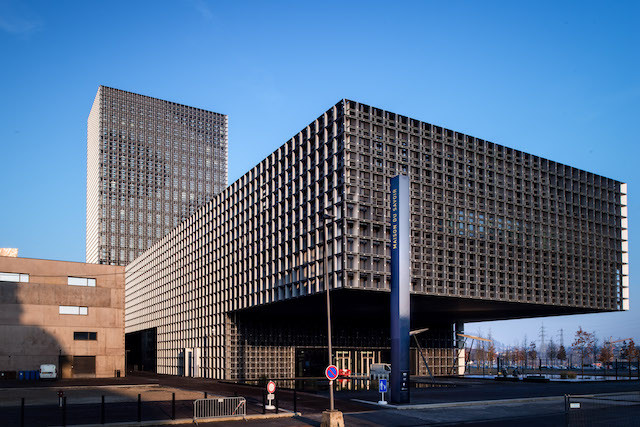In November, the University of Luxembourg celebrated its 15th anniversary. The institution has grown considerably since its foundation in 2003 and counts 6,350 students of 113 nationalities today. It existed as a cluster of different campuses for a long time but has its main base in Belval since 2015.
While it had to borrow many professors from neighbouring countries’ institutions in the early 2000s, it now proudly accommodates 250 resident professors and lecturers. To mark this occasion, Delano has talked to two extraordinary alumni about their experience.
Steve Walesch was the university’s first graduate back in 2006. He received a master’s degree in Financial Economics and now works for the Banque de Luxembourg. He completed his bachelor’s degree at the “cours universitaire,” the precursor of the uni.lu and in Strasbourg. The decision to resume his studies in Luxembourg was based on the subject-matter of the available master’s course.

Photo: Michel Brumat/University of Luxembourg. Steve Walesch, pictured at the 15th anniversary reception in November 2018, was among the university’s first graduate back in 2006
“The focus was on macro-economy and financial products, which I was most interested in,” Walesch told Delano. There were no notable clubs and societies back then: “Students took the organisation of events into their own hands, it was all rather small, especially compared to student life in Strasbourg.”
Not only were recreational activities on a smaller scale, so too was teaching. Walesch’s course comprised six students in total--each from different countries. It shows that even back then, the university had an inherently international character. Looking back, Walesch says “I’m glad that the uni.lu has developed such a good reputation in recent times. I feel like this valorises my degree, which I appreciate.”
Marie-Paule Theisen was 74 when she received her PhD in psychology in 2017, making her the university’s oldest graduate. After retiring as a primary school teacher, Theisen went back to university. “Shortly after I retired, my aunt had a serious accident and became ill. I knew a lot about children’s needs, but little about how to take care of the elderly.”
She started a master’s degree in gerontology, focusing her research on boredom in old age. “I was never bored myself though. Taking care of my relative was a full-time job, which forced me to study at night. I went to bed at 9pm, got up at 2am and studied until 6. That was my schedule for many years.”

Photo: Michel Brumat/University of Luxembourg. Marie-Paule Theisen, pictured, was 74 when she received her PhD in psychology in 2017
What fuelled this dedication was her fascination with one subject in particular: the benefit of mindfulness for the elderly. Theisen explains that mindfulness is a judgment-free awareness of the present moment, a secular practice distilled from Buddhism. For one aspect of her PhD thesis, she empirically explored the effects of mindfulness-based stress reduction (MBSR) on senior citizens in senior clubs.
For eight weeks, she taught classes on breathing exercises, hatha yoga, body scanning and meditation, to later evaluate the impact of practised mindfulness. Most participants in the study reported a positive effect in terms of stress reduction and concentration levels. She tells us that she also reaped the benefits of this herself. “Despite my tight schedule, I never had a burn-out. The mindfulness exercises helped me confront the ups and downs of life with more equanimity and I experience more gratefulness, for the big and the small things in life.”
She was the oldest student in her master’s degree but adds that “age was never an issue, I always felt welcome at the uni.lu. My PhD supervisor, the late Dr Dieter Ferring, used to say that there are three ages: the biological, the emotional and the cognitive one. For me, all of these are different,” she laughs. “When people enquire about my age I always ask them which one they want.”
Since her graduation, Theisen has worked on putting her research into practice by teaching mindfulness classes for the community in Esch-Alzette and giving a stress-reduction workshop for University of Luxembourg students. She is also thinking about conducting a mindfulness pilot study with primary school children and their teachers which she could develop into a second PhD. “I might not be able to finish that project, but if I can get the ball rolling and prepare children to become happier and healthier adults, then my life would have another purpose.”
